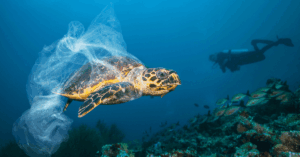
World’s First CO₂-Storing Port Infrastructure Launched In Rotterdam
June 12, 2025
Auckland’s First Fully Electric Passenger Ferry Hits The Water
June 12, 2025

The United Nations Secretary-General has warned that the world’s oceans are under attack, and the main reason behind this destruction is human greed. Speaking on the second day of the UN Ocean Conference (UNOC3) held in Nice, France, António Guterres urged governments, businesses, scientists, and communities to take strong action before it’s too late.
Addressing journalists at a press briefing, Guterres said the ocean is heading towards collapse and warned that a point may soon come where recovery becomes impossible. He said greed is the “clear enemy” responsible for the destruction, as it spreads misinformation, denies science, encourages corruption, and harms marine life for the sake of profit.
He urged world leaders, civil groups, and local organizations at the summit to work together to protect the ocean and take it back from harmful activities, saying it belongs to everyone.
Guterres laid out four major areas where immediate action is needed:
Change the way oceans are harvested – He said it’s not just about fishing, but about how it is done. Meeting the global goal of protecting 30% of the ocean by 2030 is essential.
Fight plastic pollution – He said it’s important to stop using single-use plastics, improve recycling, and reach a global deal to end plastic pollution this year.
Combat climate change at sea – Countries were asked to submit strong national climate action plans before the next climate summit (COP30) in Brazil. These plans must aim to limit global warming to 1.5°C and include all emissions, even from ships and maritime activities.
Implement the High Seas Treaty – Guterres urged countries to ratify and put into action the treaty known as the BBNJ (Biodiversity Beyond National Jurisdiction) agreement. This new treaty aims to protect marine biodiversity in international waters and must be brought into force through global participation.
The UN Secretary-General also expressed serious concern over deep-sea mining. He repeated his warning that the deep ocean must not become an unregulated zone like the “Wild West.” He voiced his full support for the International Seabed Authority, which is working to address this issue and ensure responsible governance of ocean resources.
After the press conference, Guterres visited Nice’s Port Lympia and boarded the Santa Maria Manuela, a four-masted Portuguese schooner. There, he met with representatives from the Oceano Azul Foundation, a Lisbon-based group working to stop ocean destruction and promote marine conservation.
As the summit continued, more people gathered outside the venue. While dignitaries and security teams remained present, there was also a noticeable rise in grassroots energy. Civil society groups, youth activists, and local organizations showed up to join the global call to protect the ocean.
Among them were Arzucan Askin and Gayathra Bandara, two Young Ocean Leaders and members of the Sustainable Ocean Alliance, a global youth network working for ocean protection. Bandara, who collaborates with European and U.S. researchers on the environmental impact of seabed mining, said it was disappointing to hear that some leaders at the summit supported expanding deep-sea mining. However, he was encouraged by strong statements from the Presidents of France and Costa Rica, co-hosts of the conference, who called for the practice to be suspended.
Askin said she hopes the world will unite to stop the exploitation of deep-sea ecosystems, which she described as ancient and irreplaceable. She said that these ecosystems existed long before humans and must be protected for future generations.
Two other activists, Martina Burtscher and Udani Hewa Maddumage from SeaSisters Lanka, also shared their thoughts with UN News. Their non-profit organisation uses swimming, surfing, and ocean education to empower women in coastal areas of southern Sri Lanka. They said that saving the ocean should not just be a topic of discussion, it must be at the center of global decision-making.
Burtscher said that leaders must understand the urgency of ocean protection, while Maddumage pointed out that the ocean doesn’t need human beings to survive, but people rely on it and are the ones causing its destruction. Both activists discussed the importance of including women, minority groups, and coastal communities in decision-making roles at conferences like UNOC3.
Reference: UN
Source: Maritime Shipping News


